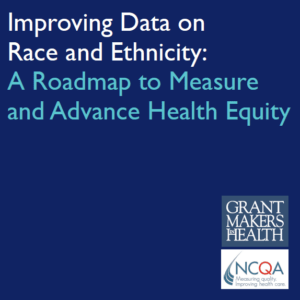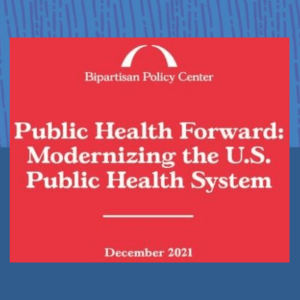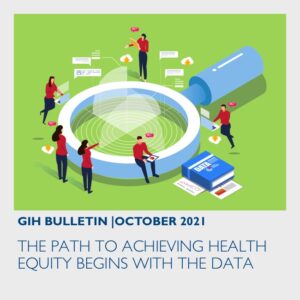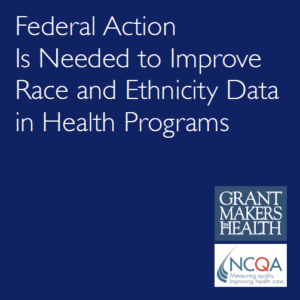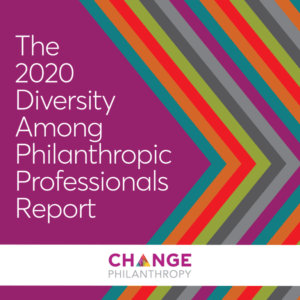Upcoming Events
Past Events
Latest Resources
Improving Data on Race and Ethnicity: A Roadmap to Measure and Advance Health Equity
The second of two reports, Improving Data on Race and Ethnicity: A Roadmap to Measure and Advance Health Equity, provides more details about race and ethnicity data collection in federally administered health programs and an expanded list of recommendations for improving the data. The recommendations consider actions for states and the private sector as well as actions for the federal government.
Public Health Forward: Modernizing the U.S. Public Health System
The Bipartisan Policy Center, deBeaumont Foundation, and the Public Health Forward Coalition has just released Public Health Forward: Modernizing the U.S. Public Health System, a five-year roadmap for public health. The report provides practical, bi-partisan actions to modernize and repair the nation’s public health system. Key recommendation for policy makers and public health departments include addressing: financing; data and information technology; workforce; public health laws and governance; partnerships; and community engagement.
Freedom to Thrive: How Health Funders Can Support Transgender Communities
Despite well-documented disparities in health and well-being, according to Funders for LGBTQ Issues, for every $100 awarded by U.S. foundations in 2018, only 4 cents directly supported transgender communities. GIH Program Director Ann Rodgers sat down with Kris Hayashi and Alexander Lee to learn more about how health funders can support transgender communities.
Moving the Needle on Black Birth Equity – A Call to Action
Philanthropy has an urgent responsibility and opportunity to address the structural factors leading to birth inequities. Healthier pregnancies, labors, and postpartum recoveries not only benefit birthing individuals, but also result in healthier children and families. Focusing attention on those who need it most could have positive implications for entire communities harmed by systemic racism for future generations. There is much work to do, but not enough philanthropic organizations are supporting these issues to tackle them at scale. We need all hands-on deck to truly move the needle. We five funders— from different states and coming to this issue from different angles—are reaching out to our fellow funders with a call to action to join us to in this work.
Understanding Power Building Ecosystems
This study offers analysis of the conditions and strategies that enhance or stymie power-building in relation to three ballot initiative issues, each of which has the potential to improve community health outcomes: Affordable Housing, Medicaid Expansion, Criminal Justice Reform.
The Path to Achieving Health Equity Begins with The Data
As we work towards a more just and equitable future, we must ensure that we have the data needed to measure the things we are trying to improve. It is no longer acceptable to say we do not know.
Federal Action Is Needed to Improve Race and Ethnicity Data in Health Programs
Grantmakers In Health, in collaboration with the National Committee for Quality Assurance, interviewed a variety of stakeholders across the country, representing all levels of the health system. Federal Action Is Needed to Improve Race and Ethnicity Data in Health Programs, identifies tangible actions to help improve the completeness, accuracy, and usability of race and ethnicity data.
Moving from Intention to Impact: Funding Racial Equity to Win
In a joint report, Moving from Intention to Impact: Funding Racial Equity to Win, PolicyLink and The Bridgespan Group examines commitment to funding for racial equity work in the US. In the last year, donors across the spectrum from foundations to corporations have made unprecedented commitments to advancing racial equity. Two key takeaways from the report to encourage funders to make real impact in racial equity is the need for transparent reporting and being responsive to the needs of movement leaders.
The 2020 DAPP Report – Change Philanthropy
Change Philanthropy has released its 2020 Diversity Among Philanthropic Professionals Report that analyzes the philanthropic workforce and identifies trends and gaps in diversity and inclusion in philanthropy. Over 2,300 individuals, including staff and board members, from 124 foundations participated through an anonymous, self-reported survey. The report covers diversity and representation across multiple areas including race/ethnicity, sexual orientation, gender, and immigration status, and highlights differences by geographical regions in the US.
Connect With Funder Peers on Health Equity
Interested in exchanging strategies, information, and questions with your funder peers? Sign up for GIH E-Forums.
Strengthen your knowledge, skills, and capacity.
GIH focuses our programming around five areas that are critical to achieving better health for all.
We invite you to explore the resources available on our focus areas pages, browse content in more specific issue areas, and to connect with GIH staff to discuss how we can partner and support your work.

